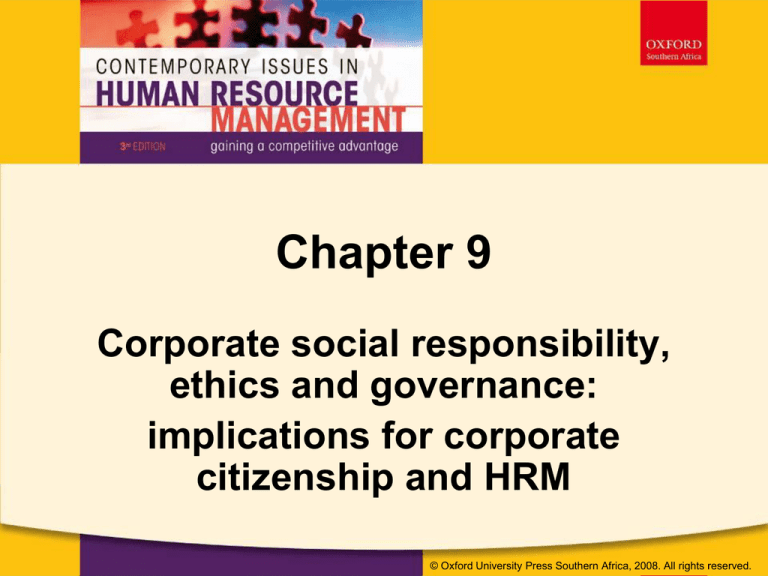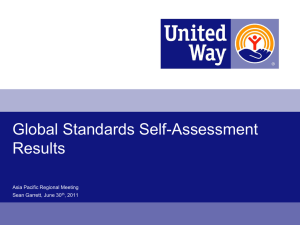
© Oxford University Press Southern Africa, 2008. All rights reserved.
Chapter 9
Corporate social responsibility,
ethics and governance:
implications for corporate
citizenship and HRM
© Oxford University Press Southern Africa, 2008. All rights reserved.
© Oxford University Press Southern Africa, 2008. All rights reserved.
Learning outcomes
After reading this chapter you should be able to:
• distinguish between the concepts: corporate social
responsibility, corporate ethics programmes and corporate
governance
• explain and discuss the shareholder and stakeholder models
of corporate social responsibility and how the two models
reflect different theories of the corporation
• identify the key components of an effective corporate ethics
programme and explain how they impact upon the
implementation of corporate social responsibility
• discuss recent global initiatives in corporate governance
• discuss the implications of good corporate citizenship for the
HR function
© Oxford University Press Southern Africa, 2008. All rights reserved.
Chapter Content
• opening case: constructive relationships bring tangible
benefits at Anglo Platinum
• introduction
• corporate social responsibility
• concepts of corporate social responsibility, corporate ethics
programmes and corporate governance are related, but
different
• corporate citizenship
• corporate ethics programmes and the elements of ethics
programmes that corporations have found most effective
• corporate social responsibility, ethics and governance, and
the implications for the HR function
© Oxford University Press Southern Africa, 2008. All rights reserved.
Introduction
• corporate social responsibility - proper balance
between obligations to shareholders and obligations
to stakeholders
• corporate ethics programmes - programmes that
enterprises institute to manage ethics, legal compliance
and social responsibilities
• corporate governance - policies, practices and
mechanisms that shareholders, executive managers and
boards of directors use to manage themselves and fulfil
their responsibilities to stakeholders, including investors
• corporate citizenship – requires both corporate ethics
and corporate social responsibility (which are
interdependent on each other)
Diverse stakeholders with whom
companies may engage
© Oxford University Press Southern Africa, 2008. All rights reserved.
Corporate social responsibility
• 3 broad types:
– narrow classical view
– socio-economic view
– broad or maximal view of corporate social
responsibility
Corporate Social
Responsibility
Viewpoints
Narrow classical
economic
(Shareholder model)
Approaches
Maximisation of
shareholder value,
uphold the law and
ethical custom,
enlightened long-term
value maximisation
Key references
Friedman, 1970
Corporate social responsibility
Corporate Social
Responsibility
Viewpoints
Socio-economic
(Stakeholder model)
Approaches
Profitability and legal
compliance
Key references
Simon, Powers &
Gunnemann, 1972;
Arrow, 1973; Stone,
Moral minimum of do no 1975; Evan & Freeman,
harm (negative duties)
1988; Bowie and Duska,
1990; Goodpaster, 1991,
Moral minimum of
1996 in West 2006.
prevent harm
(affirmative duties)
Uphold issues of justice
and rights
Respect for all
stakeholders as ends in
themselves
Social contract
Corporate social responsibility
Corporate Social
Responsibility
Viewpoints
Broad, maximal
Approaches
Profitability and legal
compliance
(Stakeholder model)
Moral minimum with
affirmative duties
Uphold justice and
rights of all
stakeholders
Active role in social
issues and contributing
to the betterment of
society through
improving social
conditions
Key references
Davis, 1973; Carroll,
1999, 2000; Mulligan,
1993; Wood, 1991; 2002;
Porter & Kramer, 2002;
Prahalad & Hammond,
2002
© Oxford University Press Southern Africa, 2008. All rights reserved.
Corporate ethics programmes
• 3 primary components:
– formulation phase
– communication phase
– monitoring and enforcement phase
© Oxford University Press Southern Africa, 2008. All rights reserved.
Effectiveness of corporate ethics
programmes
– ethics is hard to measure and any evaluation of
a corporate ethics programme must go beyond
cost accounting or savings from fewer lawsuits
– measures of effectiveness and ethical
behaviour must first determine what behaviour
is to be deemed ethical in the normative sense
– involves both processes and outcomes
promotion &
consistent
enforcement
through
positive
incentives &
appropriate
discipline
oversight by
senior
management
careful
screening of
personnel to
whom
authority is
delegated
7 minimal
processes to be
incorporated
into a
company’s
operating
structure
periodic
auditing,
monitoring &
evaluation &
implementatio
n of internal
consultative
& reporting
mechanisms
appropriate &
timely
responses in
cases of a
violation
establishment
of standards
& procedures
tailored to the
needs, size &
operating
environment
communication of
compliance
standards &
procedures to
all employees
& appropriate
training
© Oxford University Press Southern Africa, 2008. All rights reserved.
Corporate Governance
• Corporate governance and its importance
– common themes: shareholder rights, stakeholder
rights, disclosure and transparency, executive
management and board accountability
– the five pillars of corporate governance
• culture
• leadership
• alignment
• structure
• systems
© Oxford University Press Southern Africa, 2008. All rights reserved.
Corporate governance
• Theories of corporate governance
– Agency theory - because professional
managers have superior knowledge and
expertise they may act opportunistically and
gain advantage over the firm’s owners
– Stewardship theory - recognises managers as
trustworthy stewards of the resources entrusted
to them
– Stakeholder theory - corporations serve a
broader social purpose than their
responsibilities to shareholders
© Oxford University Press Southern Africa, 2008. All rights reserved.
Corporate governance
• Governance standards and principles in a number of countries
– The King Report, 1994, 2002 (King Committee on Corporate
Governance)
– OECD, 1999, 2004 (Organisation for Economic Co-operation
and Development Principles of Corporate Governance)
– SOX, 2002 (Sarbannes-Oxley Act, U.S.)
– CCUK, 2003 (Combined Code on Corporate Governance,
U.K.)
– ASXGCP, 2003, 2007 (Australian Stock Exchange
Corporate Governance Principles and Recommendations)
– AS, 8000-2003 (Australian Corporate Governance
Standards)
© Oxford University Press Southern Africa, 2008. All rights reserved.
Corporate citizenship:
implications for HR
• Corporate social responsibility and HR
– requires corporations to operate in ways that not only
avoid harming people, but which positively impact on
people’s health and safety, quality of life and personal
growth
– human resource management practices associated with
equal employment opportunities, diversity, job security,
compensation, occupational health and safety, industrial
relations, performance and remuneration and work-life
balance
– in global operations, it involves managing human rights
particularly those relating to child labour, wage
exploitation, basic health and safety, empowerment and
quality of life
5 key stakeholder groups and HR and
other attendant issues
Employees
Suppliers
Customers
Communities
Investors
• recruitment
&selection,
compensation &
benefits,
training,
occupational
health & safety,
work-life
balance,
diversity,
sexuality in the
workplace,
minority hiring
practices,
responsible
redundancy, use
of temporary &
casual workers
& workplace
culture
• ethical sourcing,
prompt
payment, use of
migrant and
child workers,
doing business
with oppressive
regimes and
human rights of
outsourced
workers
• product
manufacturing
(human rights of
workers,
product safety,
safety
standards),
labelling and
packaging,
marketing and
advertising
practices, and
pricing
• traditional
philanthropy,
community
investment and
development,
partnerships
between
employees and
communities,
environmental
issues, and
donations to
political parties
• identifying
sources of
social and
environmental
risk
© Oxford University Press Southern Africa, 2008. All rights reserved.
Corporate ethics programmes and HR
• revising written standards of ethical business conduct in
consultation with employees
• HR organise focus groups/workshops
• ethical issues should not be limited to specific HR issues it
should also include issues of primary concern to employees
in their daily work practices
• HR should provide training about these standards
• HR should:
– undertake ethics training
– implement in-depth training programmes
– initiate creative and meaningful ways to link ethics and
organisational values to performance management and
reward programmes
© Oxford University Press Southern Africa, 2008. All rights reserved.
Corporate Governance and HR
• superior governance is identified in terms of transparency,
accountability, responsibility and an independent overview of
matters relating to corporate financial, ethical, social and
environmental performance
• traditional HR activities of recruitment and selection, training
and development, performance management and
remuneration have a critical role to play in the development
and maintenance of good corporate governance practices;
not only in terms of boards of directors, but also in improving
shareholder value through the development of intellectual
capital and upholding a company’s responsibilities to
stakeholders, in particular to its employees
• ‘balanced board’
• board remuneration
• monitoring and measurement of board performance









